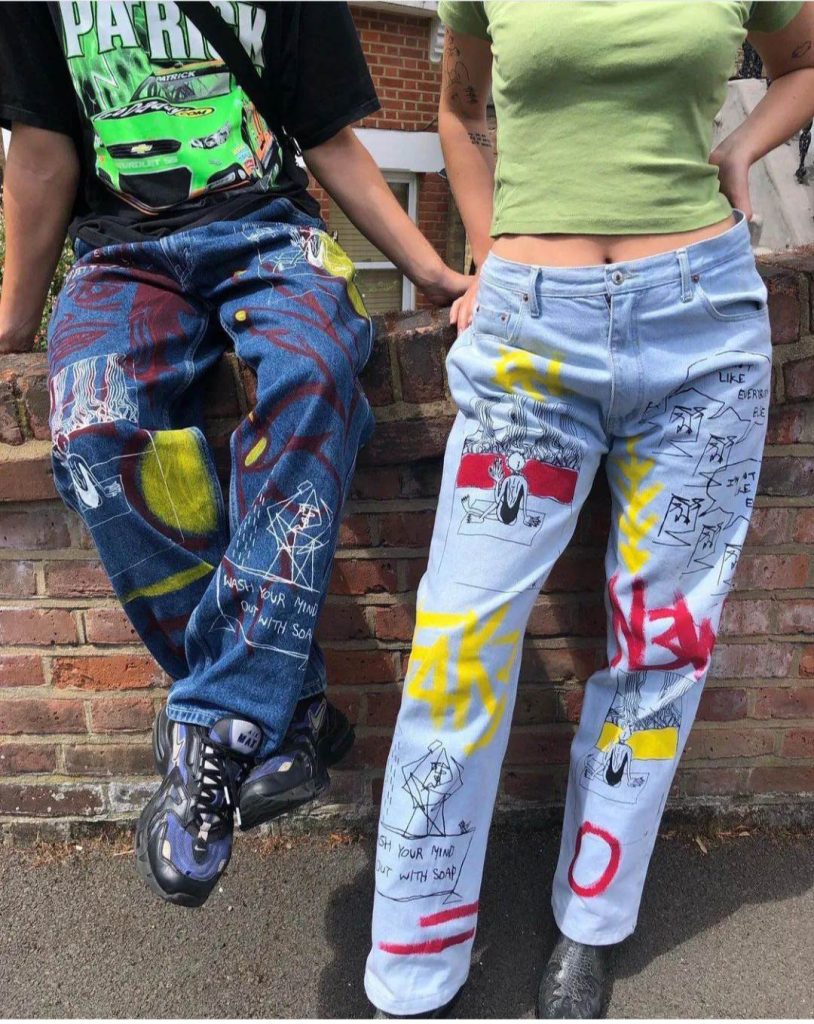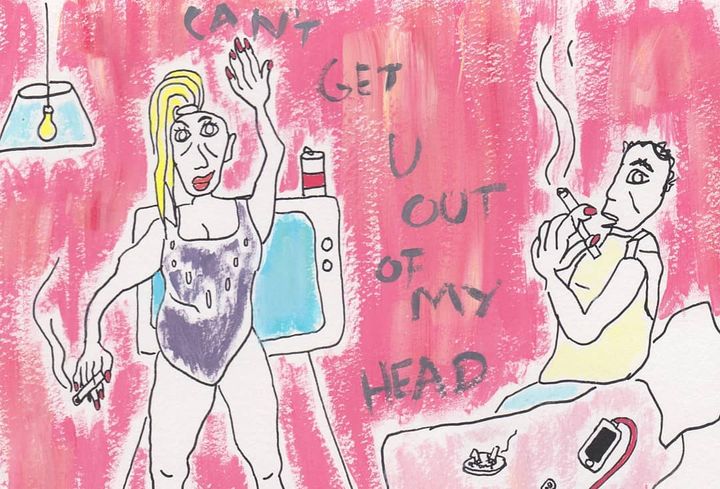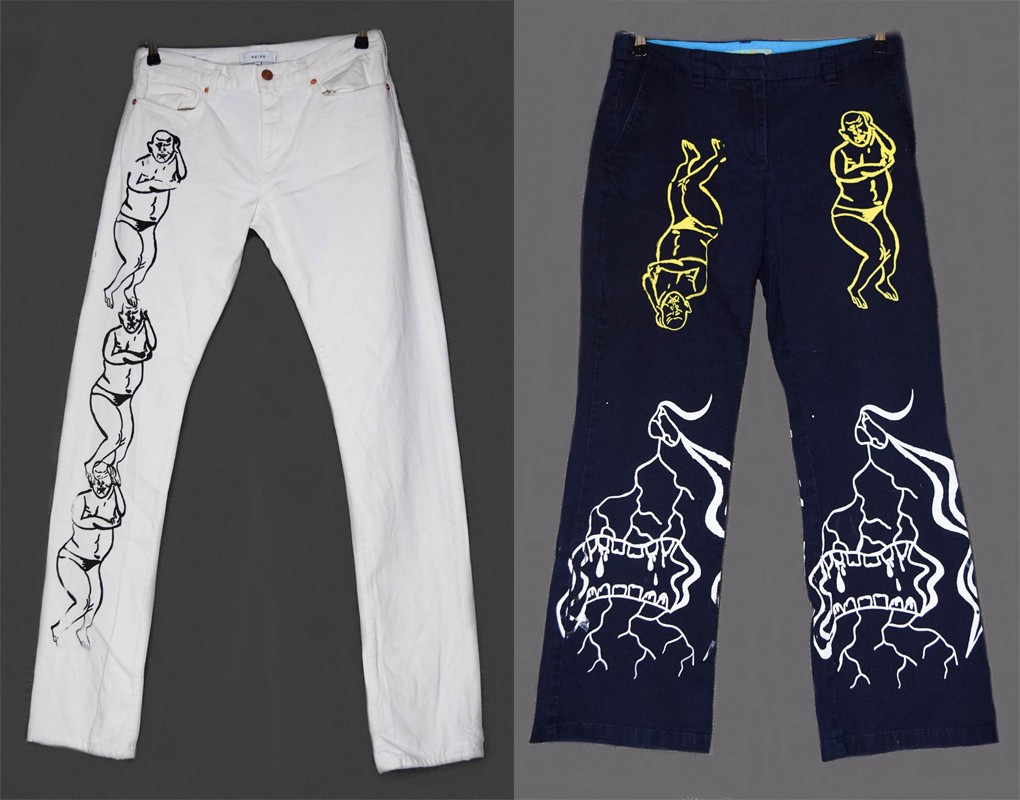A conversation with Rose Morley from F4K3 N3WS about slow fashion, sustainability and how her drawings developed into a fashion brand.
Rose Morley is an artist and founder of F4K3 N3WS, a slow fashion brand producing upcycled pieces. She describes her work as combining her interest in fashion and drawings, with her practice feeling ‘like a kind of game in which I work to produce stylish garments, playing close attention to what is on trend whilst keeping my practice second-hand based and sustainable – almost like a kind of elaborate forgery.’
In the beginning of January we spoke to Rose Morley about her slow fashion brand F4K3 N3WS, her artworks and how she ended up making original clothing – and living off selling them at Camden Market. We know Rose from the Steamship PS, the artist project space in Poplar where we hosted our launch event and where our editor Maria used to live. Here’s how that conversation went…
culturala
Hey Rose! I wanted to start by speaking a little bit about your paintings (the two you exhibited at the Steamship last November) and drawings, and how these come into your slow fashion brand. I think the reason they draw so much attention is that they’re so sharply accurate. Where do you find your inspiration? Where does the imagery come from?
Rose
I’m interested (and flattered) by your description of them as accurate, because in a way they’re quite subjective. I take a lot of inspiration from people, or rather ‘characters’ that I encounter both in close relationships and through more distant observation. If the paintings that I exhibited at the Ship felt accurate, it’s because in a way they were – they’re based on a scene that I witnessed and was part of, and the characters are people that I knew and cared about, despite their flaws – it’s not a ‘nice’ painting. Perhaps it says something about human nature and the recurrence of certain social dynamics that something so specifically personal to me can also feel accurate to a wider audience, even if they haven’t experienced exactly what I have? This is definitely an idea that I enjoy playing with. Within my clothing, obviously this effect is diluted by the need for more simple, impactful designs. However, I carry the same focus on ‘characters’ through with designs like ‘EL DIABLO’ and ‘DREAMER’.
culturala
You started upcycling clothes and combining your visual art practice and your interest in fashion when you weren’t able to find clothes that you’d like to wear while studying English lit. What kind of clothes do you make? What’s interesting for you in creating them?

culturala
Hey Rose! I wanted to start by speaking a little bit about your paintings (the two you exhibited at the Steamship last November) and drawings, and how these come into your slow fashion brand. I think the reason they draw so much attention is that they’re so sharply accurate. Where do you find your inspiration? Where does the imagery come from?
Rose
I’m interested (and flattered) by your description of them as accurate, because in a way they’re quite subjective. I take a lot of inspiration from people, or rather ‘characters’ that I encounter both in close relationships and through more distant observation. If the paintings that I exhibited at the Ship felt accurate, it’s because in a way they were – they’re based on a scene that I witnessed and was part of, and the characters are people that I knew and cared about, despite their flaws – it’s not a ‘nice’ painting. Perhaps it says something about human nature and the recurrence of certain social dynamics that something so specifically personal to me can also feel accurate to a wider audience, even if they haven’t experienced exactly what I have? This is definitely an idea that I enjoy playing with. Within my clothing, obviously this effect is diluted by the need for more simple, impactful designs. However, I carry the same focus on ‘characters’ through with designs like ‘EL DIABLO’ and ‘DREAMER’.

culturala
You started upcycling clothes and combining your visual art practice and your interest in fashion when you weren’t able to find clothes that you’d like to wear while studying English lit. What kind of clothes do you make? What’s interesting for you in creating them?
Rose
Simply, I upcycle (predominantly denim) trousers. However, in terms of style, I try to keep the brand as open as possible. Something that I enjoy about using second hand materials is that there is a limitless number of cuts, colours and styles of trousers that I can experiment with. For me, the lottery of what I have to work with is part of what makes it most interesting. Another thing that makes my job interesting to me, is the constant experimentation with to what extent I can ‘nod’ to trends and play into certain aesthetics, whilst still creating a unique product. I try to combine popular mainstream styles (for example, the current explosion of the Y2K aesthetic), with something more intriguing and unfamiliar, through the addition of my art.
culturala
Let’s turn to slow fashion. Without going into the (nonexistent) line between fashion and art, how do you see clothes as artistic? And what is slow fashion for you? How do we achieve that on a global scale?
Rose
I think that clothes are perhaps the most accessible form of art. Obviously, it’s important to appreciate that many people can’t afford or access the clothes that they want to wear. Despite this, I feel that even the most ragged favourite sweater is, in a way, a form of self expression, in which there is something inherently artistic. It also links back to the idea of the distinct but still familiar ‘character’ idea that influences a lot of my work. Fashion in general, I would argue, mirrors this idea, paradoxically embodying both the unique and the relatable at the same time.
For me, slow fashion on a global scale is a very difficult question as it arguably inevitably means a scaling down, and somewhat of a backtracking from the cyber globalisation represented by brands such as SHEIN. In an ideal world, this would mean more people making their own clothes and more smaller independent brands which work on a smaller scale. However, the current political and economic climate in which we live is so driven by capitalism and consumerism that a lot would have to change before people would have time, money and incentive to do these things. A revolution in fashion would need to ride on the wave of a much larger revolution, one concerned with our general notions of what is disposable, and what it actually means when we throw something away and buy something else. In terms of the political promotion and aid of slow and ethical fashion, I’d also obviously advocate for government subsidies for small businesses with ethical practices.

culturala
For the inspiring question now! How did you start your brand, how did you end up selling at Camden market and how did you make it work? Suppose some of our readers would love to follow your footsteps. What would your advice to them be?
Rose
This is always kind of a hard question to answer, because in many ways, it was luck. I was at a squat party and a stranger told me they liked my trousers, and that they knew someone who was running a project in Camden through which sustainable artists could sell in the market for free for up to ten weeks. By removing the financial disincentive of having to gamble money on stall rent, this project launched me from selling a couple of items a month, to running my own business full time. Before my business was supporting me in the way that it is now, I encountered a lot of creatives that told me that it was all about social media, and that I just needed to put more money and time into instagram/tiktok and general marketing. I actually found that it was looking out into the real world that really brought me the success that I wanted. It was only when I stopped stressing about online engagement and started meeting people, selling in markets and properly talking to people who stopped by my stall, that opportunities started coming. I’m not saying marketing isn’t important, but from my own experience, my advice is literally just to get outside, talk to strangers, be bold in asking questions, and see what opportunities might be waiting for you.
culturala
You’re now going on a big trip to South America and also taking a 6-months break from f4k3 n3ws. Will you come back to creating fashion, you think, or are you looking to take your practice elsewhere?
Rose
I’m hoping to return from South America with lots of new ideas that I can channel into continuing my work in fashion. However, one of the downsides of working in markets is that your platform is not really your own, and can be taken away at any moment. Over the past year, the management at Camden market has grown steadily more hostile and inflexible, and in booking this trip I am certainly taking the chance that I will no longer be able to sell there when I return due to some kind of change in policy/ rules/ increased rent. This is something that I have thought about and am willing to risk, however it does mean that I can’t return to the UK with any particular expectations that my life will look the same as it does now.
You can find Rose’s work through her website, f4k3n3ws.com or on Instagram via @f4k3.n3ws and @rose.jpeg – or keep up-to-date with her latest news via her profile on our network page.
We use cookies to make sure you get the best out of our presence, and by using our website, you agree to our use of cookies. For more information, read our Policies or reach out to us by email.